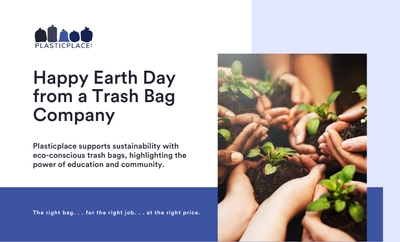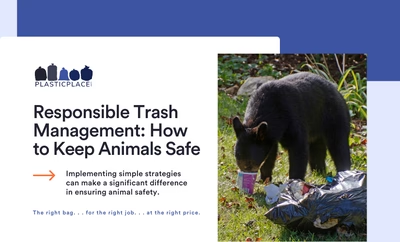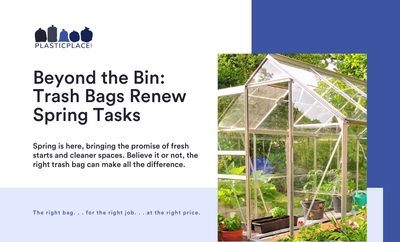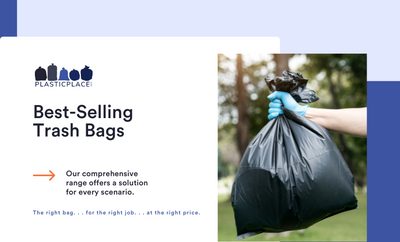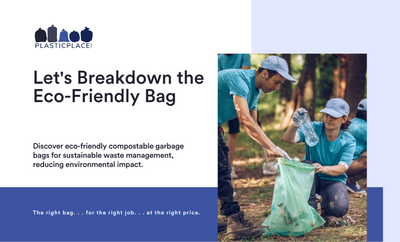Once upon a time, a century or so ago, as the second industrial industry was booming, trash took on a life of its own. In an era of unprecedented progress and mass production, the question of what to do with the mounting heaps of waste became an urgent concern. Communities grappled with various disposal methods, from the fiery incineration of trash to burying and feeding it to wild animals.
Back then, a solution was still a few decades away—a hero in the form of the plastic garbage bag. And now, in 2024, people are in a full-on plastic panic. Surprisingly, as we dive into the environmental impacts of alternative disposal methods, we'll uncover a truth: the plastic garbage bag, often criticized for environmental impact, might just be our best option for responsible waste management. Let’s break down the various ways to get rid of trash.
Is Burning My Trash Okay?
The simple answer is no, but let’s look more in-depth. As a garbage disposal method, incineration involves the controlled combustion of waste materials at high temperatures. It gained popularity in the mid-20th century as a solution to the growing trash problem. Today, the process typically occurs in specialized facilities designed to minimize emissions and capture energy produced during combustion. While it may seem like an efficient way to eliminate waste, the environmental consequences of incineration are not to be underestimated.
Air Pollution and Greenhouse Gas Emissions
Trash incineration is a pressing environmental issue, contributing significantly to air pollution and greenhouse gases. Incinerating waste releases harmful pollutants like sulfur dioxide, nitrogen oxides, and particulate matter, harming air quality and public health, especially near incineration sites. Additionally, it emits carbon dioxide (CO2), a potent greenhouse gas that worsens climate change. A study by Christine Wiedinmyer reveals that incineration is responsible for 40%–50% of global CO2 emissions from waste. Since conducting this study, we’ve added 1 billion people to the world’s population. What does that mean? More trash.
Health Hazards
Whether in backyards or incineration facilities, burning waste has far-reaching health and environmental consequences. It poses risks to both human health and the environment. The Minnesota Pollution Control Agency has even gone as far as saying, “If you’re burning garbage, you’re making poison.” Research has shown that backyard burning can increase the risk of heart disease, worsen respiratory conditions like asthma and emphysema, and cause symptoms like rashes, nausea, and headaches. Additionally, it produces harmful dioxins and toxic chemicals that can contaminate crop waterways and eventually enter the food chain, affecting our health.
Is Burying My Trash Okay?
Okay, burning trash is extremely toxic. What about burying garbage? Again, the short answer is no. Why? Read on.
Burying trash as a widespread waste disposal method might seem straightforward, but it comes with various environmental challenges. The consequences of burying waste can be more significant than meets the eye.
Groundwater Contamination
One of the primary concerns associated with burying trash is the potential for groundwater contamination. As waste decomposes over time, it can generate harmful leachate, a liquid that percolates through the layers of garbage and carries contaminants like heavy metals and toxic chemicals. This liquid poses a substantial risk to groundwater quality, potentially affecting drinking water sources that rely on them.
Disrupting Ecosystems
Often, burying trash involves altering the landscape, leading to changes in land use that disrupt natural habitats. This habitat destruction can have far-reaching consequences, affecting local ecosystems and biodiversity. Landfills may also emit unpleasant odors and attract scavengers, further impacting the surrounding environment and causing disturbances to nearby communities.
So, What is the Best Way to Dispose of My Trash?
Now that we’ve examined alternative disposal methods, we’ve come full circle back to the plastic bag. While we won't sugarcoat the environmental effects of plastic bags, comparing their impact to burning and burying waste is vital. Each method has its environmental pros and cons. Plastic bags have been vilified for their perceived negative effects, but a closer look suggests that their environmental footprint may not be as severe as other disposal methods.
Surprisingly, this analysis unveils the unexpected environmental benefits of plastic bags, showcasing their advantages of energy consumption, emissions, and resource utilization. These findings challenge conventional wisdom and emphasize the critical role of informed waste management decisions. Ultimately, your choice in how you use your trash bag is a testament to responsible disposal practices.
The Future of Waste Management
Plastic waste management's future holds promising developments emphasizing sustainability and environmental responsibility. Innovations in biodegradable and eco-friendly plastics offer a compelling solution to the enduring pollution problem. Scientists and manufacturers are working on creating bioplastics that decompose naturally without leaving harmful residues behind.
Additionally, community-driven initiatives focusing on reducing plastic waste at the source are gaining momentum worldwide. These grassroots movements encourage individuals and businesses to adopt eco-friendly practices like responsible disposal. Collaborative efforts between governments, industries, and consumers are essential for achieving a more sustainable and plastic-conscious future, where waste management is not just a defensive strategy but a proactive commitment to preserving our planet.
Regardless of innovation, it's crucial to emphasize the significance of responsible plastic bag disposal. Here’s what you can do:
Reduce Waste
- Buy products with minimal packaging or in bulk to reduce packaging waste.
- Opt for products with longer lifespans and durability to reduce disposables.
Recycle Properly
- Familiarize yourself with local recycling guidelines and follow them diligently.
- Rinse and clean recyclables before placing them in recycling bins.
- Separate recyclables from non-recyclable to prevent contamination.
Reuse Items
- Find creative ways to repurpose items instead of discarding them.
- Donate or sell items that are in good condition but no longer needed.
- Consider borrowing or renting items instead of buying them.
Hazardous Waste
- According to local guidelines, hazardous waste materials, such as batteries and chemicals, should be safely disposed of.
- Use eco-friendly alternatives to hazardous household products whenever possible.
Educate Yourself
- Stay informed about the waste management practices in your area.
- Encourage friends and family to adopt responsible waste management practices.
Exploring options like burning and burying trash showed us their not-so-great environmental impacts. Plastic bags can be a more responsible choice when we compare them. But no matter what, the key is to be accountable for plastic bag disposal. We can all do our part by reducing waste and educating ourselves. It's about lessening our impact and making the world more sustainable. In the end, when used responsibly, the plastic garbage bag can be a smart choice for handling our trash in today's world.
Key Takeaways:
- Plastic Bag Emergence: Plastic garbage bags emerged as a solution to waste problems a century ago, despite criticism of their environmental impact.
- Environmental Drawbacks of Alternatives: Burning and burying trash have significant environmental drawbacks, including air pollution, groundwater contamination, and habitat disruption.
- Responsible Management Matters: Emphasizing responsible plastic bag disposal and waste management practices is essential for a more sustainable future.





